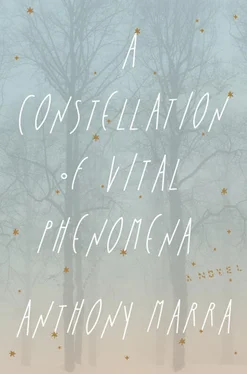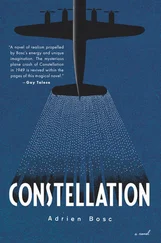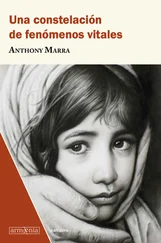“I remember once, on my birthday, when I was a child, I came into the kitchen and saw a huge wooden box on the table,” Laina said. “I was so happy. I couldn’t imagine what wonderful present lay inside such a big wooden box.”
“What was it?”
“A casket. My aunt was inside.”
Sonja bit her knuckle. When they were children they had pretended to have a third sister, a black-haired girl named Lidiya. Like Alu, the ghost sister was never around, and in her absence they had teased, chided, scorned, blamed, and hated Lidiya so they could love each other more simply.
“I’m afraid to leave the apartment,” Natasha was saying. “I’m afraid of the city. There’s just so much open air now. I’m afraid of nearly everyone. I don’t know why. Everyone scares me but you. Even Sonja can be scary. Sometimes, if I let myself think about Italy, my body shuts down. It’s like I’m not in charge anymore, my brain turns off, and I have to lock myself in my room and barricade myself with furniture. I feel so stupid. I’m such an idiot.”
“Do you see the chariots?”
“No, not yet. I see a wallet, though.”
“A wallet?”
“Yes, there was this man, and when he was dressing his wallet fell out of his trousers and he had a picture of his children in one of those plastic credit card flaps. That was the day when I gave up.”
“It’s good to talk about these things. It will keep the chariots and wallets of the world honest. They will know we see them, and are not afraid to sound like madwomen.”
“Yes, I like talking with you.”
“We’re staying alive.”
Sonja stood and walked to the flat, afraid of what she might hear next. At the kitchen table she examined the glass of ice. Each cube was rounded by room temperature, dissolving in its own remains, and belatedly she understood that this was how a loved one disappeared. Despite the shock of walking into an empty flat, the absence isn’t immediate, more a fade from the present tense you shared, a melting into the past, not an erasure but a conversion in form, from presence to memory, from solid to liquid, and the person you once touched now runs over your skin, now in sheets down your back, and you may bathe, may sink, may drown in the memory, but your fingers cannot hold it. She raised the glass to her lips. The water was clean.

FIVE HOURS AFTER his first successful amputation, Akhmed’s hands stopped shaking. The frost-caked road glared up at him, the more menacing since he’d seen, up close, what it could do. He had sawed straight through that poor man’s leg. He hadn’t been able to grip the saw until Sonja’s fingers had wrapped around his. Until hers had pushed his hand forward. The man he had imagined himself to be had died the moment she set the blade against the bone and pushed his hand forward. He was one more instrument for her manipulation. Her face had hardened with a marble-like resolve unmoved by both his and the other man’s suffering. As if she hadn’t known that leg belonged to someone. As if she hadn’t known the hand she held did as well. Pushing the blade forward, she had observed him as if he were the patient. And he had been. As the saw teeth caught on the bone, she had performed a second surgery, one less bloody but no less brutal, excising from his heart the impulse to run, to cower, to let the man bleed to death rather than face the horror of saving him. The amputation had left both patients lighter.
Watching for the slightest rise in the road, he still felt more like that young man than he did that doctor. He was nothing like Sonja. She was the strangest Russian he’d ever met, a riddle wrapped inside a mystery inside a set of unattractive but very white scrubs. What parts had she discarded for the sake of her sanity? What had she cut from herself? Had he stared into her pupils he would have emerged, bewildered and blinking, on the far side of the earth. Was he awed by her? Absolutely. Did he respect her? Unequivocally. Want to be anything like her? No, never, not at all. If he never again saw the beige corridors of Hospital No. 6 he would call himself lucky. But he had to go back in the morning; he had an agreement. A woman so casually capable of cutting off a leg was capable of throwing out an orphan girl.
Two hundred meters away, at a crook in the road, a diffuse fan of headlights turned into view. He ran. Birch trunks divided the beam into pale yellow blocks as he sheltered behind a half-rotted log, sucking on snow to mask his breath. Once the headlights passed he glimpsed the red of Ramzan’s pickup heading toward the city. He bit his knuckle, unable to recall its Latin name. Ramzan couldn’t know. He couldn’t. When the taillights shrank to a distant scarlet flush he returned to the road, massaging the soreness between his thumb and index finger. In that busy afternoon his palm had had two more opportunities to callus.
A half kilometer from the village the flicker of a campfire jumped through the underbrush. With the pickup truck halfway over the horizon, curiosity rather than fear led Akhmed back into the forest. He crept with the faith that the flames spoke louder than the frost beneath his boots. There, in the clearing, a man made of shadow passed pamphlets to that shivering brightness. The dogs, lounging beside the fire, heard him before the man.
“It’s Akhmed,” he called over the dogs’ growl. Never had he understood the obligation Khassan felt for those filthy, diseased animals. His son made him a pariah, but the dogs weren’t helping. Another handful of pages fluttered into the fire. “What are you doing?” he asked.
Khassan was studying the sheet of paper in his hand, where in the fifth sentence of the second paragraph, in the gap of a missing comma, he found the sorrow of his life. The sentence described the upbringing of a minor eighteenth-century tribal leader, and it would be the last time human eyes would read the name of the tribal leader’s mother. “A punctuation error,” he said, with the tremble of more ominous inaccuracy. “I’ve read through that paragraph hundreds of times and never caught it.”
“Don’t do this,” Akhmed said. He could have reached out, caught it, and kicked snow on the fire, but the page with the punctuation error was already smoke, and the name of a mother who died two hundred and twenty-three years earlier was already lost. He emptied his lungs but his sigh wasn’t finished; it went on emptying him. One spring day, when Akhmed was a child, Khassan had led him to a logging field a half morning’s walk from the village. Men with roaring orange saws had leaned into beech trunks and the trunks had spumed clouds of sawdust and groaned as the green treetops toppled. He was eight years old and the stumps were shorter than he was. “Hundred years to get that tall,” Khassan had said, and turned for home.
“I was thinking of someone I lost many years ago,” Khassan said. “She called me a coward once. It wasn’t what she said, but the way she said it. As if her judgment just passed through me. As if I were a cloud.”
The fire had thawed the overhanging branches. Droplets sliding down the slender fingers turned to steam before landing in it. Nothing Akhmed could say would put this man back together. “You were a good husband,” he said. “Your wife loved you.”
Khassan looked confused, as though he hadn’t been thinking of his wife at all, and reached to the ground for another stack of pages. “My wife didn’t, but thank you,” he said, nodding to the fire. “Forty-four thousand three hundred and thirty-eight pages. It took five hours to count. Over twenty trips to carry them. No wonder these pups are so tired.” He knelt and patted the bald dog’s stomach with an awful affection. “Each page averages three hundred and fifty words. That’s fifteen million words I’ve written.”
Читать дальше












